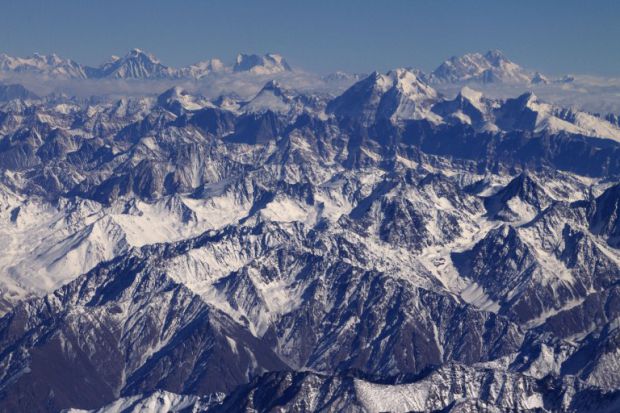Veterans’ Writing: An Ugly Place
 An Ugly Place by Andrew Miller
An Ugly Place by Andrew Miller
A clear blue sky hangs over me and dangles a few wispy clouds. Out to my right is a striking mountain range; the beginnings of the Hindu Kush are here. I face towards my home and a lone feature dominates, spanning from my front to my right. I call it “The Matterhorn” but never learn its real name. We're driving along a road, contained on its left by a six-foot-tall mud wall. This road. Light, dusty, grey. Dirt that’s easy to dig in, easy to dig deep, easy to hide things deep below. Between me and The Matterhorn at right are irrigated farm fields that survive off the spring melt from above.
April 29th starts cold at seven thousand feet of elevation. The open sun issues a hollow challenge to the early afternoon; I feel a superficial warmth that won’t last and will not pierce any surface. It’s still cold in the shade.
It smells, it smells like so many things. Sweat. Anger. Gunpowder, dirt, blood. Oil, fire, engine fluids.
I have never been so thirsty in my life. I cannot overcome the dryness to speak. Even if I could, nothing would be heard. The machines are too loud. Everyone around me is using his machine. Some are louder than others, some bigger. As though you could make someone more dead if your machine was bigger.
The machine that started this , that heated this country road to become a hot brand whose mark I keep with me, sits nearby. It was more effective, simpler, smaller, and cheaper than any of our machines.
Between mechanical roars, I reach some awareness of screams, commands, confusion. Their machine worked just as intended and now I can’t stop staring. The muscles directing and focusing my vision are paralyzed. My eyes continue to pull the truth and explain clearly, but my brain refuses the dialogue. I know this is death. I’ve seen death before. I can't bridge the connection and my brain stalls on this concept like an engine sucking water. The Kid occupies a tired, ashen, dignified pose that none around him disturb. Unrelenting, my eyes repeat the same exhausted argument through nerves into my head as I flash through my last words to him, to get the fuck out of the operations center, go write home somewhere else. Finally, I am pulled back to the things around me. Seconds have passed. I leave him alone, as the others already have.
The ongoing screaming around me finally registers. That Kid is gone but others aren’t; one has no legs. I had left my Radio Man to tell our story to Our Friends back home, and between sprints I become voiceless. I have to drink. The road’s dust becomes less hostile once I have my water. My huge gulps calm my body. I find my Radio Man as a confused parrot, echoing broken bits of others' shouts and sharing fear over the net. I take his radio and give Our Friends the news, I tell them what we need and where we need it. We need it now. The biggest machines in this terrible place are with Our Friends. We will hear those machines cheering soon.
Later, the noises lessen. Only burning and dimly popping pine needles carry this aural wildfire into darkness: pot-shots from the smallest machines. Sober pauses and delayed acceptance converge on the survivors like plague, amputating hopes and euthanizing feelings. This part is unfamiliar to me and feels more savage than anything else done to us. All of the machines that deserved a chance to speak, have, in turn, done so.
Read Jerk's feature story on the Syracuse Veterans’ Writing Group in the December 2014 issue.
